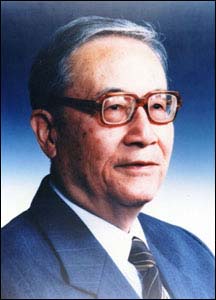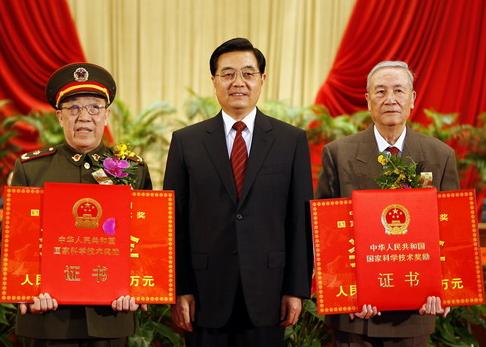
Renowned meteorologist, climate change pioneer and CAS Member YE Duzheng died Wednesday in Beijing. He was 97.
 |
| CAS Academician YE Duzheng (Image by CAS) |
Throughout his decades-long career, Prof. YE made major contributions to the study of atmospheric circulation, and the fields of climate and global change.
A graduate of Tsinghua University, Prof. YE earned a Ph.D. in meteorology from the University of Chicago in 1948. He returned to China in 1950, becoming a professor at the CAS Institute of Geophysics. He later helped establish the Institute of Atmospheric Physics and served as its director. He subsequently became vice president of CAS.
Prof. YE is known as the originator of the theory of energy dispersion, a theory based on his doctoral dissertation. It remains one of the three major theories in meteorological dynamics.
In the 1950s, Prof. YE made pioneering contributions to the meteorology of the Tibetan Plateau, noting the effect of the plateau region on global climate change. In the 1960s, he formulated the theory of seasonally abrupt change in atmospheric circulation. The theory has underpinned weather forecasting in China through the present. In the 1980s, Prof. YE encouraged research on climate change in China, despite an atmosphere of academic cautiousness in the earlier years of reform and opening up. By drawing a link between climate change and human activity, Prof. YE helped develop the field of “global change.” He strongly supported sustainable development and noted in 2005 that average temperatures might increase a life-changing eight or nine degrees Celsius within 100 years if no changes were made to control global warming.
In 1980, Prof. YE was elected to membership in CAS. In 1987, he received a National Natural Sciences Award First Prize for his contribution to understanding the general atmospheric circulation of East Asia. In the same year, he also received a National Natural Sciences Award Second Prize for his work involving pressure and velocity fields.
In 1995, Prof. YE received the first Ho Leung Ho Lee Prize for Scientific and Technological Achievement as well as the Tan Kah Kee Prize For Earth Science. In 2003, he received the 48th International Meteorological Organization Prize – often called the “Nobel Prize of Meteorology.”
In 2005, Prof. YE received China’s Supreme Science and Technology Award, the country’s highest science and technology prize, which is bestowed by the Chinese president.
 |
| YE Dujian won Science and Technology Award in 2005. (Image by Xinhua) |
Throughout his career, Prof. YE helped train numerous atmospheric science researchers, including five subsequent CAS Members. In addition, he encouraged international cooperation in the field of climate and global change research. He helped launch and oversee important international research projects, such as a collaborative project with the U.S. Department of Energy on carbon dioxide-induced climate change. He also launched and presided over international academic conferences.
Prof. YE was a Foreign Member of the Finnish Academy of Science and Letters as well as an Honorary Member of the Royal Meteorological Society (UK) and the American Meteorological Society. He was also a Member of the Joint Scientific Committee/World Climate Research Program, the International Geosphere-Biosphere Program, the Executive Committee of the International Association of Meteorology and Atmospheric Physics, and the International Union of Geodesy and Geophysics Bureau. Furthermore, he was president of the Chinese Meteorological Society for several years.
Asked years ago if he regretted returning to China to pursue his career, Prof. YE said being in China had not only allowed him to make a contribution to his country and the Chinese people, but had given him a platform both to conduct research and do practical work in the field of meteorology. Altogether, he emphatically concluded he had “absolutely no regrets” about his decision.

86-10-68597521 (day)
86-10-68597289 (night)

86-10-68511095 (day)
86-10-68512458 (night)

cas_en@cas.cn

52 Sanlihe Rd., Xicheng District,
Beijing, China (100864)

